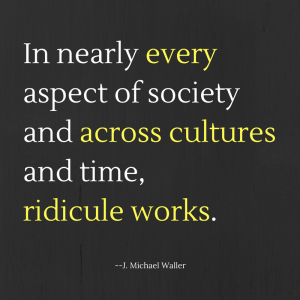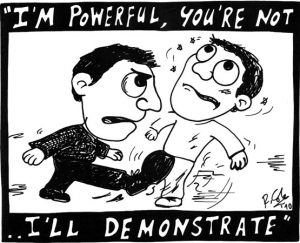What role for ridicule in resistance movements?
March 17th, 2017 | Published in Social justice
Ridicule works, a meme attributed to Professor J Michael Waller tells me.
Waller is a scholar-practitioner in strategic communication, public diplomacy, information operations, and psychological operations. He sounds like he should know.

But, what does ridicule work to do, I wondered? Especially if the aim is to subvert abusive power. Here are some of the questions I found myself asking.
Seven questions about ridicule
- Have you ever been the object of ridicule? How did it make you feel? How did you react?
[Me: Yes, I was an object of ridicule, for all sorts of reasons, as an adolescent. I wanted to disappear.] - If you haven’t been an object of ridicule, how do you imagine it would it make you feel? How do you think you would react?
- Have you ever used ridicule as a tactic? What was the effect?
[Me: I try to avoid using ridicule. However, some of our current politicians do strike me as quite ridiculous, so there’s a grey zone where sarcasm can creep in.] - If you have used ridicule as a tactic, was it directed at someone with more, less, or similar sociopolitical power
 compared with yourself? Did the power relationship make a difference to the effect?
compared with yourself? Did the power relationship make a difference to the effect?
[Me: I expect any disparaging comments I make about politicians or others in positions of power would pass under their radar. I’m generally more meticulous about avoiding ridicule when interacting with people I see as having equivalent or less power than I do. Having said that, the best people to comment on the effects of ridicule are those at the receiving end.] - How do you respond if you witness ridicule directed at others (for example, friends, family, colleagues, or public figures including politicians)?
[Me: I would normally try to deflect the conversation away from the personal and towards the issues. I do sometimes struggle, however, with the line between taking a swipe at smug politicians and critiquing their marginalising policies.] - What do you think of ridicule being used as a means to an end? What would be a justifiable ‘end’?
[Me: I’m generally suspicious of means-ends arguments. They have, for example, given us offshore processing and abuse of people seeking asylum. These abuses are rationalised by politicians on the basis of promoting national security and border control.] - If ridicule was effective in challenging abusive power (as an end) would that override any reservations you might have about using it as a means? (If, for example, ridiculing Donald Trump could undermine him sufficiently to topple him from his perch as President of the United States?)
[Me: I would have to think about this on a case-by-case basis, and would have to agree with the end. In the case of Trump, I would agree with the goal. However, making him a figure of fun has been tried and hasn’t worked (yet) except perhaps to make him increasingly erratic.]
I wanted to share these questions and would love to get responses to them. I also wanted to reflect on ridicule more generally – its differential effects across divisions of power, as a precursor of violence, in relation to utilitarian arguments, and in terms of its contribution to overall resistance.
Ridicule across divisions of power
Ridicule, it seems to me, is an expression of contempt. The impact of contempt, according to Karen Stohr, depends on the relative sociopolitical power of the people involved.
“Contempt expressed by the socially powerful toward the socially vulnerable is a much greater moral danger than contempt that flows in the opposite direction.”
 The contempt directed at welfare recipients, caught up in the flawed robo-debt program of Australia’s social security system, is a current example. Responses by key politicians, segments of media and social media have further victimised the victims. Damage to people’s health, mental health, and safety has been huge.
The contempt directed at welfare recipients, caught up in the flawed robo-debt program of Australia’s social security system, is a current example. Responses by key politicians, segments of media and social media have further victimised the victims. Damage to people’s health, mental health, and safety has been huge.
Reciprocal contempt expressed by the victims, on the other hand, has little likelihood of reciprocal impact.
Key ministers including Christian Porter, Minister for Social Services, and Alan Tudge, Minister for Human Services, have mostly responded with a stream of disdain. Tudge was referred for investigation to the Australian Federal Police for breach of privacy after personal and protected information about a Centrelink recipient was disclosed to media. The person concerned had written an opinion piece in which she said she had been terrorised by Centrelink in relation to a debt she didn’t owe.
Relatively powerful people express their contempt in actions. They cut benefits to pensioners and those who are unemployed, disabled, or not earning enough to live on. They cut funding to public health, mental health, education and welfare. They incarcerate Aboriginal people at escalating rates. And, they detain people seeking asylum indefinitely.
Contempt by those with less power can be expressed in ridicule and satire. This might be cathartic, promote solidarity at the grass roots, and provide relief from the lived reality of abusive power. The chances of actually subverting such power, however, seem remote.
Charlie Chaplin is remembered for his ridicule of Hitler. But, if it got under Hitler’s skin it certainly didn’t make his rhetoric less effective or prevent him amassing destructive armies.
Contempt by the relatively powerless can also be expressed through petitions and protests. These can be hugely labour-intensive and have no guarantee of success. Indeed, protest may simply inspire further contemptuous actions such as additional restrictive protest laws.
As Stohr notes: “A contemptuous protest sign directed at the president is not on a par with a contemptuous remark made by that president.” She cites Trump’s characterisation of Mexicans as rapists, and women as sex objects as offensively marginalising examples.
Those in relatively powerful positions are insulated from the worst of contempt’s effects, Stohr argues. Their agency is not diminished. “Socially vulnerable people cannot win the battle for respect by using contempt as a way to demand it.”
Even worse, current methods of resistance may be counterproductive, strengthening oppressive regimes by giving them something to fight against.
Ridicule as precursor of violence
Contempt, Stohr argues, turns people into objects to be managed or obstacles to be overcome. Once people have been dehumanised, it becomes relatively unproblematic to direct violence towards them.
The idea that it’s okay to “punch a fascist” has enjoyed some currency on social media. This idea arose from an  incident at an anti-Trump rally shortly after the inauguration.
incident at an anti-Trump rally shortly after the inauguration.
In Australia, “punch a fascist” has been promoted as a response to the contempt shown by far-right groups for people who are ‘different’ (mostly those who are non-white and/or Muslim).
Reams have been written on both sides of the “punch a fascist” argument. I’m not convinced by those advocating punch-ups. And, I’m not prepared on any evidence I’ve seen to let go of my strongly held view that responding to hate, bigotry, and violence with more violence achieves little but to perpetuate violence.
I find myself agreeing with Daniel Nicholson that little is achieved by “yelling ar right wing fringe groups across a police barricade”. I wonder instead what inspiration can be drawn from role models like Martin Luther King Jr. His methods were strictly nonviolent and he considered that violent protests simply gave white people an excuse to look away.
Ridicule as bit-player in resistance
Ridicule, other expressions of contempt, and violence all strike me as negative and destructive, achieving little but to fuel more ridicule, contempt, and violence.
This TED presentation on non-violent methods of resistance identifies more than a hundred such methods so, at best, ridicule would only ever be a minor contributor. It can be powerful as Sophia A McClennen illustrates, but there’s also a risk of drawing out even worse bullying behavior on the part of relatively powerful targets.
An interview about “dacking” (pulling down an adversary’s pants in public) recognises that there can be “a high price to pay for a bit of a laugh”! In a liberal democracy we’re supposed to be arguing about ideas. All dacking really seems to achieve is to diminish the status of the dacker.
And, maybe “laughtivism” as McClennan refers to a class of tactics, including ridicule, has a role to play in buoying the troops and creating community of those “who are in on the joke”. But, to what extent is that simply a side effect if the main goal is to topple abusive regimes and figures of abusive power?
Ridicule – not an end, limited as means
My view is probably clear. I do not like ridicule as a tactic and have doubts about its effectiveness in challenging power from a position of lesser power. I also feel that expressing ridicule diminishes the moral authority of the agent, particularly if violence is involved. It may ‘work’ in some ways – promoting solidarity, providing catharsis – but if the endgame is to subvert abusive power it can, at best, contribute as a bit-player in a more diverse approach.
I would welcome other views, and also other answers to my earlier questions about ridicule.
In conclusion, here’s a further question that has recently scrolled across my newsfeeds: “If this was 1934, and you were in Germany, what would you be doing?”

………………………………………………….
(NOTE: If you like this post, you might also be interested in
“Six ways political protest is more than self-indulgence“)
Scroll down for comments
First-time comments have to be moderated. I try to complete that process, and respond, within 24 hours.
Do check back.
Social justice is for everyone (previously 2020socialjustice) is also on Facebook (click here)
Twitter (click here)
 compared with yourself? Did the power relationship make a difference to the effect?
compared with yourself? Did the power relationship make a difference to the effect?

